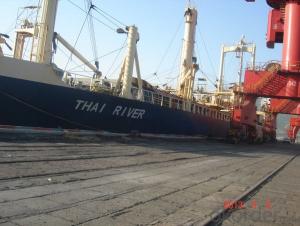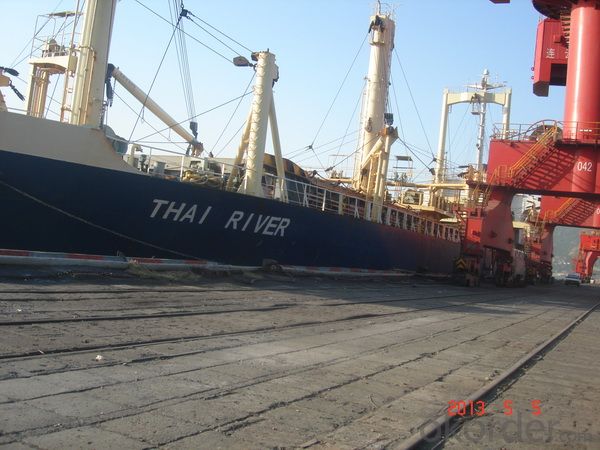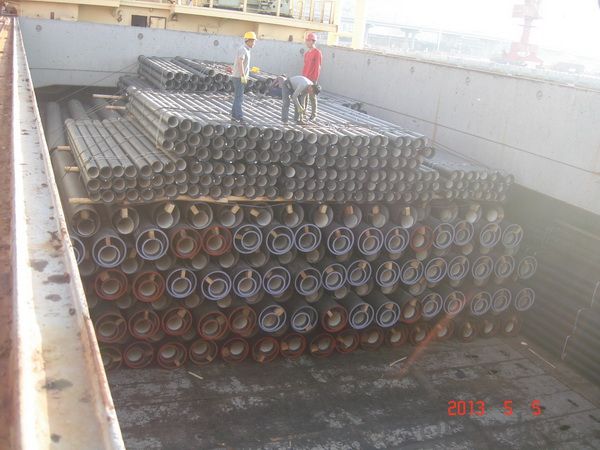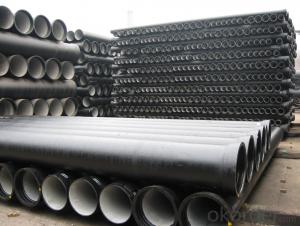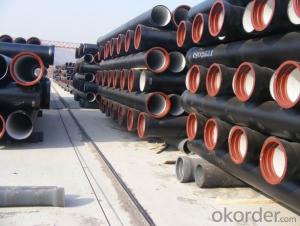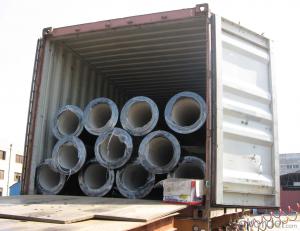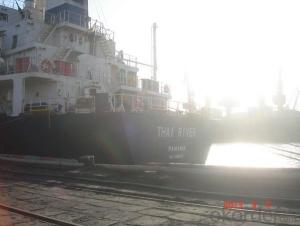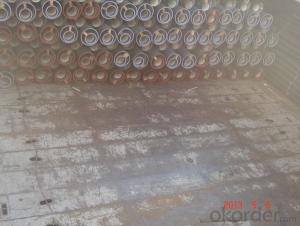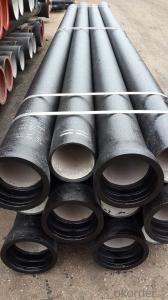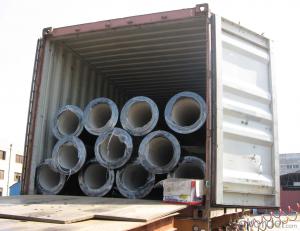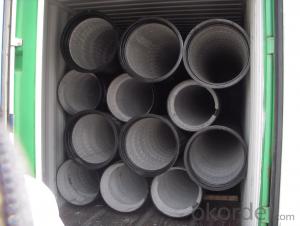DUCTILE IRON PIPES AND PIPE FITTINGS C CLASS DN600
- Loading Port:
- Tianjin
- Payment Terms:
- TT OR LC
- Min Order Qty:
- 22 pc
- Supply Capability:
- 3000 pc/month
OKorder Service Pledge
OKorder Financial Service
You Might Also Like
Material : Ductile Cast Iron
Size Range : DN 80mm to DN 2000mm
Unit Effective Length : 6m or 5.7m
Manufacture Standard: ISO 2531:1998/ EN 545:2006/EN 598:2007
Annual capacity : 200,000 tons
Coating Exterior: Zinc 130g/m2 according to ISO 8179-1 and bitumen coating 70 microns.
Cement Interior: Portland Cement/ High Alumina Cement/ Sulphate Resisting Cement Lining according to ISO 4179
Special requirements on external coating and internal lining can be applied
We also provide accessories such as SBR/EPDM rubber gaskets, lubricant paste, pipe caps, PE sleeves, etc.
Additional Parts:
Each pipe is strictly inspected according to related standard to ensure permanently high performance.
Easy Installation at site and service free for life
Long Service Lifespan
Quotation will arrive you within 24hours once we get your inquiry.
We guarantee offering you a competitive price.
A copy of original inspection reports of pipes will be offered after shipment.
Photos of loading process will be sent to the customer after shipment effect.
We will follow-up the delivery progress after shipment effect and update to the customer on weekly basis.
- Q: Are ductile iron pipes suitable for use in mining applications?
- Yes, ductile iron pipes are suitable for use in mining applications. Ductile iron, also known as nodular cast iron, is a type of iron that has been treated with magnesium or cerium to alter its microstructure, making it stronger and more flexible than traditional cast iron. This enhanced strength and ductility make ductile iron pipes highly resistant to impact, corrosion, and abrasion, which are common challenges in mining environments. In mining applications, ductile iron pipes are often used for various purposes such as water supply, slurry transportation, and ventilation systems. Their excellent durability and resistance to wear and tear make them ideal for handling abrasive materials, chemicals, and high-pressure fluids commonly found in mining operations. Furthermore, ductile iron pipes' ability to withstand heavy loads and external pressures makes them suitable for underground mining applications, where they may need to support the weight of overlying rock layers. Their high tensile strength and flexibility help prevent pipe failure and minimize the risk of leaks or breaks, ensuring the safety and efficiency of mining operations. Additionally, ductile iron pipes are relatively easy to install, maintain, and repair. They can be welded or joined using mechanical couplings, allowing for quick and efficient installation in mining sites. Their corrosion resistance also reduces the need for frequent maintenance and replacement, resulting in cost savings for mining companies. Overall, the superior mechanical properties and durability of ductile iron pipes make them a reliable and practical choice for use in mining applications.
- Q: How are ductile iron pipes repaired in case of damage?
- Due to their high durability and strength, ductile iron pipes are commonly utilized in various applications. However, like any other materials, these pipes can sustain damage over time due to external influences or internal corrosion. In such instances, there exist several techniques available for repairing ductile iron pipes. One prevalent method is the trenchless repair technique, which allows for the restoration of the damaged section without the need for extensive excavation. This method typically employs specialized equipment to access and repair the affected area. Its advantages lie in minimizing disruption to the surrounding environment and reducing excavation costs. Another approach for repairing ductile iron pipes involves the application of epoxy lining. This process entails the use of epoxy resin to seal any cracks or leaks on the interior surface of the pipe. Epoxy lining is a cost-efficient and effective solution as it provides long-lasting repairs and enhances the overall condition of the pipe. In cases where the damage is severe or extensive, it may be necessary to replace the damaged section of the ductile iron pipe. This typically involves removing the compromised portion and installing a new pipe section. The replacement process may require excavation and can be more time-consuming and costly compared to other repair methods. Nonetheless, it guarantees a comprehensive and permanent solution for the damaged pipe. It is essential to note that the choice of repair method for ductile iron pipes depends on factors such as the extent of the damage and accessibility. Professional assessment and inspection play a crucial role in determining the most suitable repair technique. Consulting experienced pipeline repair specialists or civil engineers is highly recommended to ensure the most effective and durable repair solution for ductile iron pipes.
- Q: Can ductile iron pipes be used for both water and sewage systems?
- Ductile iron pipes can serve for both water and sewage systems, owing to their remarkable strength and durability. Renowned for their exceptional mechanical properties, these pipes can endure the immense pressure and stress encountered in such systems. Furthermore, their resistance to corrosion renders them optimal for transporting both clean water and sewage. Consequently, ductile iron pipes emerge as a dependable and adaptable option for water and sewage systems, given their wide-ranging applications.
- Q: Can ductile iron pipe be used for irrigation systems?
- Indeed, irrigation systems can utilize ductile iron pipe. Ductile iron proves to be a robust and enduring substance capable of withstanding the demanding conditions of high pressure and continuous water flow necessary for these systems. Its resistance to corrosion renders it appropriate for subterranean applications where it may encounter moisture and soil. Furthermore, ductile iron pipes possess the advantage of being capable of supporting substantial loads, a crucial aspect for irrigation systems potentially relying on heavy machinery or vehicles. In conclusion, ductile iron pipe represents a dependable and enduring option for irrigation systems.
- Q: Can ductile iron pipes be used in contaminated groundwater systems?
- Yes, ductile iron pipes can be used in contaminated groundwater systems. Ductile iron pipes are known for their high strength and durability, making them suitable for various applications including water and wastewater systems. They have corrosion resistance properties that protect against internal and external corrosion, making them a reliable choice for transporting water, even in contaminated groundwater systems. When dealing with contaminated groundwater, it is essential to consider the level and type of contamination present. Ductile iron pipes are resistant to many common chemicals found in groundwater, such as certain acids and alkalis. However, in cases of severe or specific chemical contamination, it may be necessary to consider alternative pipe materials that offer better resistance to those specific substances. Furthermore, proper installation and maintenance practices are crucial to ensure the long-term performance of ductile iron pipes in contaminated groundwater systems. Regular inspections, cleaning, and the use of appropriate protective coatings can help mitigate any potential risks associated with contamination. Overall, ductile iron pipes can be effectively used in contaminated groundwater systems, provided the level and type of contamination are within acceptable limits and proper installation and maintenance practices are followed. It is always recommended to consult with experts and consider local regulations and guidelines when making decisions regarding the suitability of pipe materials in specific groundwater systems.
- Q: Can ductile iron pipes be used in marine environments?
- Yes, ductile iron pipes can be used in marine environments. Ductile iron is a type of cast iron that exhibits excellent mechanical properties, high corrosion resistance, and durability. These properties make it suitable for various applications, including marine environments. Marine environments are known to be highly corrosive due to the presence of saltwater, high humidity, and other harsh conditions. However, ductile iron pipes are designed to withstand such conditions. They have a protective layer called the "graphite skin" that acts as a barrier against corrosion. This graphite skin helps to prevent the formation of rust and protects the pipe from degradation. Furthermore, ductile iron pipes can also be protected with additional coatings or linings to enhance their resistance to corrosion in marine environments. These protective coatings can include epoxy, polyurethane, or zinc coatings. These coatings act as an extra layer of defense against corrosion, ensuring the longevity and reliability of the pipes in marine environments. It is important to note that proper maintenance and regular inspection are necessary to ensure the optimal performance of ductile iron pipes in marine environments. This includes regular cleaning to remove any marine growth or debris that may accumulate on the pipes and conducting routine inspections to detect any signs of corrosion or damage. In conclusion, ductile iron pipes can indeed be used in marine environments. Their inherent corrosion resistance, durability, and the ability to apply additional protective coatings make them a suitable choice for various marine applications.
- Q: Ductile iron pipe is how many years warranty
- Ductile iron pipe is a kind of cast iron pipe. In quality, the spheroidization of cast iron pipes is controlled to be 1-3 (spheroidization rate 80%), so the mechanical properties of the material have been better improved, with the nature of iron and the properties of steel. Ductile cast iron pipe after annealing, the microstructure is ferrite and pearlite, good mechanical properties, excellent corrosion resistance, good ductility, good sealing effect, simple installation, mainly for municipal, industrial and mining enterprises, water supply, gas, oil etc..
- Q: Can ductile iron pipes be used for water treatment plants?
- Yes, ductile iron pipes can be used for water treatment plants. Ductile iron pipes have excellent corrosion resistance and durability, making them suitable for transporting water in water treatment plants. Additionally, their high tensile strength allows them to withstand the high pressures often found in these facilities.
- Q: How many casting methods are there in ductile iron casting? A 60*6 discus can not have sand holes. Its surface is smooth. What process can be used to make it?
- This is such a small piece, do not worry about shrinkage, mainly pay attention to sand hole and slag. With Disa wet molding line, a box of more pieces, suitable for mass production, defects will be relatively less. By using other methods (resin sand coated sand, etc.) can also be the main attention, don't type it, then the level of liquidity and relatively ductile iron, gray iron poor, sand and gas can not go up, sand holes or pores will spread in the discus plane.
- Q: Can ductile iron pipes be used in areas with high levels of heavy metal contamination?
- Areas with high levels of heavy metal contamination can indeed utilize ductile iron pipes. Ductile iron, known for its strength and durability, is resistant to corrosion, thus making it ideal for various environmental conditions, including those with heavy metal contamination. The structural integrity and performance of ductile iron pipes remain unaffected by the presence of high levels of heavy metals in the surrounding soil or water. These pipes feature a protective lining, typically made of cement mortar or polyethylene, which acts as a barrier between the pipe and its environment. This lining effectively prevents the leaching of heavy metals into the flowing water. Moreover, ductile iron pipes have demonstrated exceptional resistance to chemical corrosion, including that caused by heavy metals. Consequently, they have been extensively used in industrial settings where heavy metal contamination is prevalent, such as wastewater treatment plants, industrial facilities, and mining sites. However, it is crucial to emphasize the importance of regular monitoring and maintenance for ductile iron pipes, even though they can withstand high levels of heavy metal contamination. These measures ensure that the protective lining remains intact and any potential issues are promptly addressed. In conclusion, ductile iron pipes are a suitable choice for areas with substantial heavy metal contamination. Their strength, durability, and resistance to corrosion make them a reliable option for transporting water and other fluids, even in challenging environments.
Send your message to us
DUCTILE IRON PIPES AND PIPE FITTINGS C CLASS DN600
- Loading Port:
- Tianjin
- Payment Terms:
- TT OR LC
- Min Order Qty:
- 22 pc
- Supply Capability:
- 3000 pc/month
OKorder Service Pledge
OKorder Financial Service
Similar products
Hot products
Hot Searches
Related keywords
